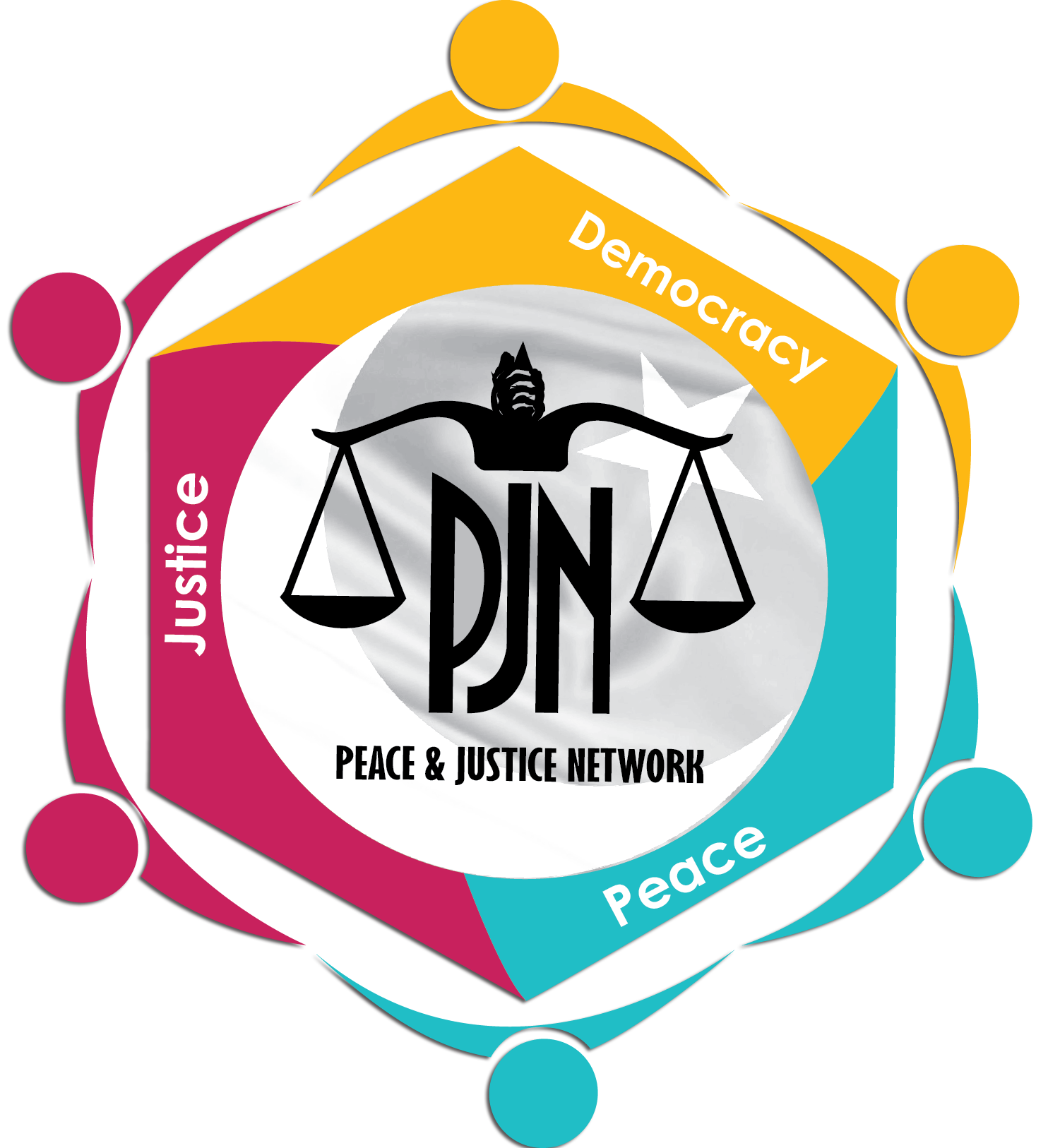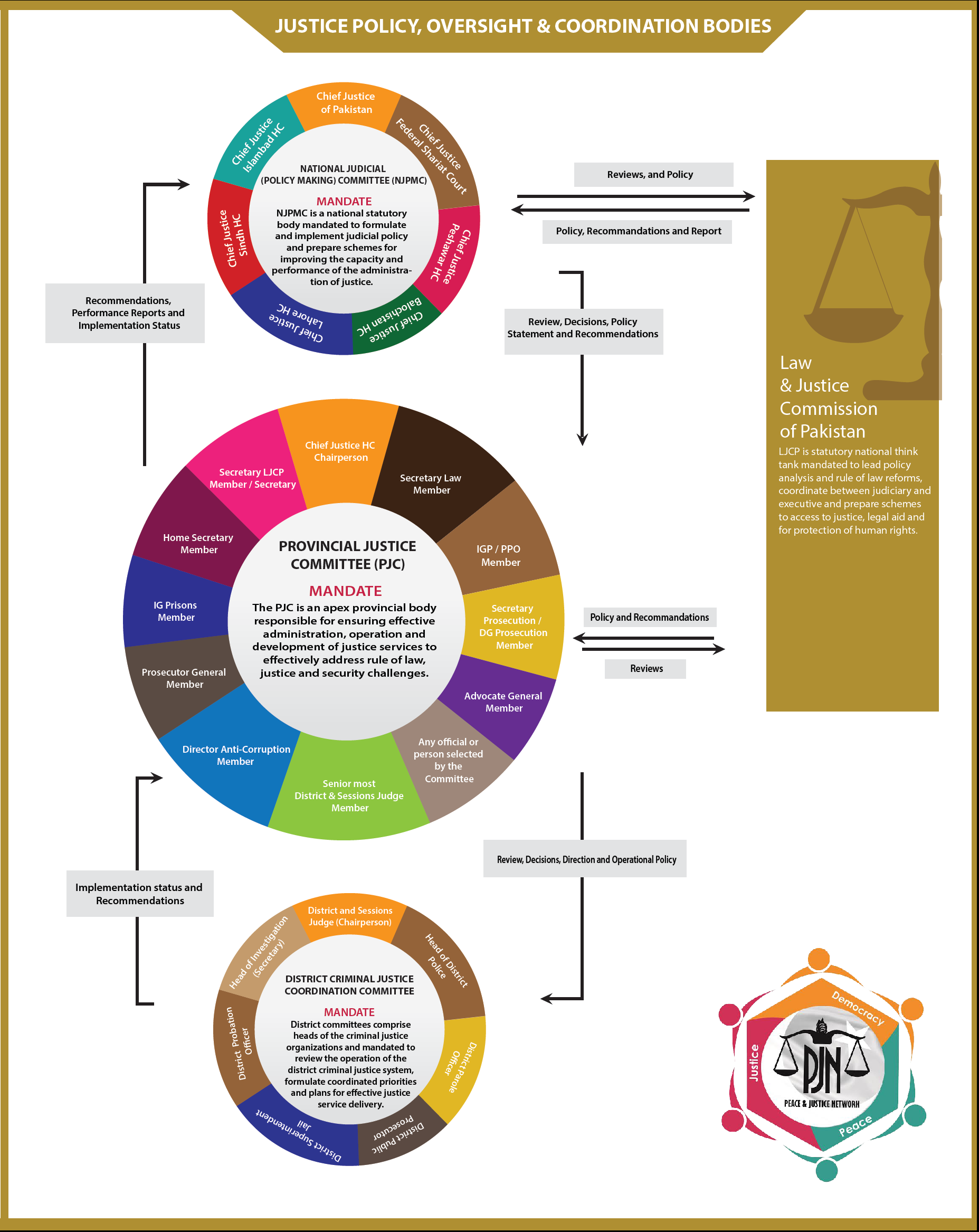

Justice Policy, Oversight & Coordination Bodies
National Judicial (Policy Making) Committee (NJPMC)
The National Judicial (Policy Making) Committee is constituted under an Ordinance (LXXI) of 2002. The Chief Justice of Pakistan is the Chairman of the Committee and the Chief Justice, Federal Shariat Court and Chief Justices of the High Courts are its members. TheSecretary, Law & Justice Commission of Pakistan is designated as the Secretary to the Committee. The Secretariat of the Commission provides secretarial advices to the Committee.
Functions:
The National Judicial (Policy Making) Committee is required to coordinate and harmonize judicial policy within the court system, and in coordination with the Law & Justice Commission of Pakistan, ensure its implementation. The Committee performs the following
- Improving the capacity and performance of the administration of justice
- Setting performance standards for judicial officers and persons associated with performance of judicial and quasi judicial functions
- Improvement in the terms and conditions of service of judicial officers and court staff, to ensure skilled and efficient judiciary
- Publication of the annual or periodic reports of the Supreme Court, Federal Shariat Court, High Courts and courts subordinate to High Courts and Administrative Courts and Tribunals.
The Committee is required to publish an annual report of its activates and such other periodic or special reports relating to its functioning, as it deems fit. The reports are submitted to the President of Pakistan.
Provincial Justice Committee (PJC)
The Justice Committee shall be an apex body of Islamabad Capital Territory responsible for ensuring the effective administration,operation and development of a fair, Impartial and inclusive rule of law and organisations to address provincial law, justice and security challenges within the ICT. To this end, the Justice Committee shall as a forum for provincial inter-organisational coordination and cooperation:
- Review the law and order status in the province/jurdisdication and take necessary measure/s to enhance the operation and effectiveness of the rule of law organisations.
- Lead The Review, formulation, coordination and implementation of rule of law reforms in the province/jurdisdication.
- Formulate policies and plans for effective implementation of the rule of law to address security and justice challenges.
- Review, formulate and coordination the design, implementation and impact of rule of law reforms and related projects and programmes.
- In particular to improve Service Delivery:
- Enhance coordination between the respective rule of law organisations.
- Enhance judicial-executive coordination to improve justice sector service delivery.
- Conduct institutional, organisational and impact assessments to review and strengthen departmental/organisational performance and effectiveness.
- Formulate and implement performance standards.
- Formulate and implement monitoring and evaluate frameworks to ensure effective and timely service delivery and reform implementation.
- Develop operating process, procedures, plans and policies to enhance the quality of justice and security effectiveness.
- To review the performance of and provide policy guidance to the district Criminal Justice Coordination Committees (DCJCCs), or their equivalent bodies.
- To review DCJCC recommendations and where necessary issue policy and/or operational directions and/or measures.
- Make recommendations to the Federal and Provincial governments and the LJCP to strengthen rule of law institutions and organisations to improve Service Delivery.
Criminal Justice Coordination Committee (CJCC)
(1) The Criminal Justice Coordination Committee shall-
- keep under review the operation of the criminal justice system and work towards the improvement of the system as a whole;
- promote understanding, co-operation and coordination in the administration of the criminal justice system;
- exchange information and give advance notice of local developments, which may affect other parts of the system;
- formulate co-ordinated priorities and plans to give effect to locally agreed policies;
- raise relevant issues with the appropriate authorities;
- promote the spread of good practices; and
- review the implementation of any decisions taken by the Criminal Justice Coordination Committee.
(2) The meeting of the Criminal Justice Coordination Committee shall be held at least once a month. The secretary of the committee shall record the minutes of the meetings.
Copyright © 2026 pjn.org.pk

